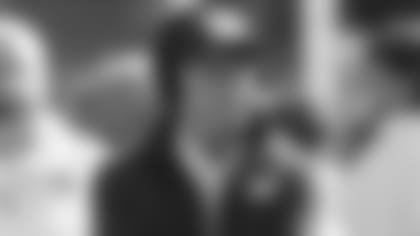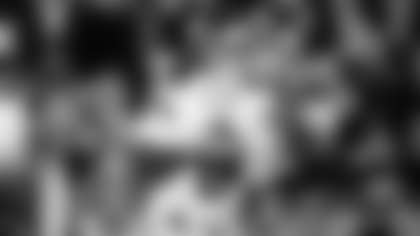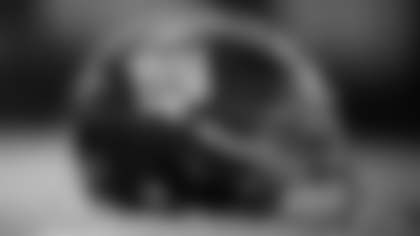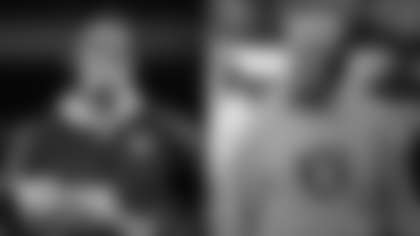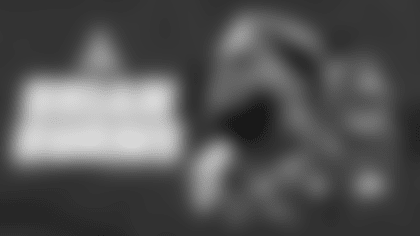Q: You've been asked about the rivalries in the NFC East and how competitive they are. Do you talk to the players about what it means to play in the NFC East?
Coughlin: "I talk to them about the NFC East being the toughest division in all of pro football. I talk to them about the extreme tradition between all of the franchises because, in fact, they have been playing each other for so very, very long. When a game comes along like the Redskins game or the Eagles game, that's pretty easy. Dallas is maybe relatively new in terms of historical perspective, but the other teams certainly are among the league's founding fathers. So yes, we talk about that."
Q: When you're on the sideline, is there a different feel to a division game? Are they more intense? Are they more physically and emotionally taxing than other games? Are they different?
Coughlin: "They're different because you put so much stock in them, so much meaning in these games, because they really are like two games. People start in the offseason with your research against your divisional opponents. You naturally think that you know a lot more about your divisional opponents than you do about some of the other teams that you play only on a revolving nature, so that leads to it. But the significance of being in the division since the divisions were revised (in 2002) and since you have only four teams in the division, you play each other twice, you see what the significance is. It is the arrow pointed toward the playoffs."
Q: You didn't play the Cowboys that long ago. When you play a rematch, you want to be able to do what you did well, but you also have to change things up because you can't have the exact same plan. Are you trying to do two different things there when you have a rematch?
Coughlin: "You are, but you're still looking at every opponent. What was done by the opponent? How are they attacking? How are they defending? What can be done in terms of special teams? How are the special teams affecting the game? What is the field position situation? You have all those things going for you with regard to studying, but you have to remember what you do well and what the opponent hasn't done well and that becomes a factor of what you're trying to create in order to get to something you feel like you can. Pro football, more than any other game in my opinion, is the recognition of the players themselves and their strengths and their weaknesses and how you go about attacking or defending based on their strengths."
Q: The two-minute drill got a lot of attention after the exploits of Eli Manning and Victor Cruz against Washington. You practice the two-minute drill just once a week. Do you try to make it as competitive as possible for Eli?
Coughlin: "It is. It's ones against ones."
Q: Is that the only time you have the first offense going against the first defense?
Coughlin: "No. We do our rally stuff with ones against ones, but you have to remember, it starts in training camp. It's always been a huge indicator for me. It is one of the most competitive drills that you have in camp, when they're going against each other all the time. You're going against each other, ones against ones, twos against twos all the time, but that drill is extremely competitive and sometimes it gets so hot that you're concerned about the nature of making sure everybody comes out of the thing feeling … the injury factor pops into your mind, but it's very competitive."
Q: Do you try to change it up as far as time remaining, field position, timeouts left?
Coughlin: "I always do. I change the whole thing up. I change up field position. I change up how many timeouts. Normally I don't mess much with timeouts because I do emphasize saving your timeouts, so I usually stay relatively conservative there. But we move the ball. If I move it into plus-territory, I'll cut the timeout stuff and also the time. So it's always a relatively minimal amount of time. It's usually a lengthy drive. It's normally to be in position for a field goal and how that particular thing is managed. The quarterback has a lot to do with the drill itself in terms of what he wants to call and also most of the time I leave the timeouts up to him in that drill. Now in the regular two-minute drill during the season, I take the timeouts."
Q: You have the second fewest penalties and penalty yards in the league. You've been preaching about penalties for nine years. How much of a factor has that been in your success?
Coughlin: "I think it's a huge factor. When you indicate to your team from the get-go that, first, you have to keep from beating yourself before you can appreciate the opportunity to beat someone else, it starts with turnovers and penalties and all those things which reinforce the other guy rather than you. So we're still harping on that and I hope we're getting to where there's some consistency there. I do want my finger on keeping that number low so we give ourselves the best opportunity to win. The concern that pops up from time to time, like two weeks ago, when we had only three penalties, but two of them were on special teams and you're talking about a penalty on a punt return or a kickoff return that's devastating, because of what it does with field position. You go from the ball being at the 20 to the 10 or inside the 10 and that's an incredible, incredible distance to have to, percentage-wise, go score."
Q: David Diehl had started every game in his career before suffering a knee injury that kept him out of three games. He isn't starting now and has a reduced role, but seems to be working at it without complaint.
Coughlin: "David is a guy that's going to do anything he can to help the team win. The thing is, you fight your way back from something like that and you are also battling your physical stature, even as you return, and your confidence. He's done a good job with that, but it's a process."
Q: Hakeem Nicks said he's been grinding through because of his knee injury. Eli said he noticed that Hakeem looked better in practice. That he would go out there and grind when he wasn't 100 percent - do you admire that in players when they do that?
Coughlin: Absolutely. He's very competitive and he wants to play and he wants to help his team win. He's a very, very dissatisfied guy when he's on the sideline and he really doesn't even like it when he's not practicing. So he really made a decision a week ago where he talked to the trainers about letting him (practice) the first day of the week and the thing that was interesting, he was none the worse for wear. When he came back Thursday, he was a little bit better and Friday was a little bit better. So the continuation of that is very, very important to us. You'd like to see him at 100 percent. Whether he can get there or not this year, I don't know, but Hakeem at 95 percent and just playing really hard, we can do some things to take some snaps off him in certain situations, perhaps. But the balancing factor of how you attempt to defend us is in jeopardy when you have people that are performing at the level we know they can play at."
Q: Is Stevie Brown one of these guys that have a magnet that attracts the ball?
Coughlin: "He seems to have been in the right place at the right time in key moments a couple of times this year and he's also brought the ball back. He's given us field position after the interceptions, which have been outstanding. He's very fast. He does have the speed and he has the size and he's put himself in position where he's really contributed by virtue of not only being in the right place and intercepting the ball, but running it back and giving us good field position."
Q: He has three 40-yard returns.
Coughlin: "Yes, it's unusual."
Q: When you play Dallas, I usually ask you about Tony Romo. But it seems like every time he needs to make a play, he throws to Jason Witten, especially on third down. How is Witten so productive?
Coughlin: "He's very crafty. He's very good at his trade. He finds a way to get himself open. In key spots in the game, the ball is going to come his way, you know it is and the two of them are on the same page."
Q: The Cowboys were determined to upgrade at cornerback and signed Brandon Carr and drafted Morris Claiborne. Have you seen an improvement in their pass defense?
Coughlin: "They're playing well, but they have the pass rush, too. They have really solid firepower up front and this has helped tremendously as well. If you look at the numbers and where they are in terms of their ranking in the league against the pass, it's very good (third in the NFL)."
Q: Danny McCray leads them in special teams tackles and he seems to be in the middle of everything. Do you have to account for him?
Coughlin: "Definitely on special teams is where you notice him first and foremost. And then, of course, he's had to take over since (safety Barry) Church's injury and he's played very well. He's even in the dime package, so he's on the field an awful lot and he has good speed and he's competitive and you know he's an outstanding tackler from special teams. So he's come in and done a nice job for them."
[


